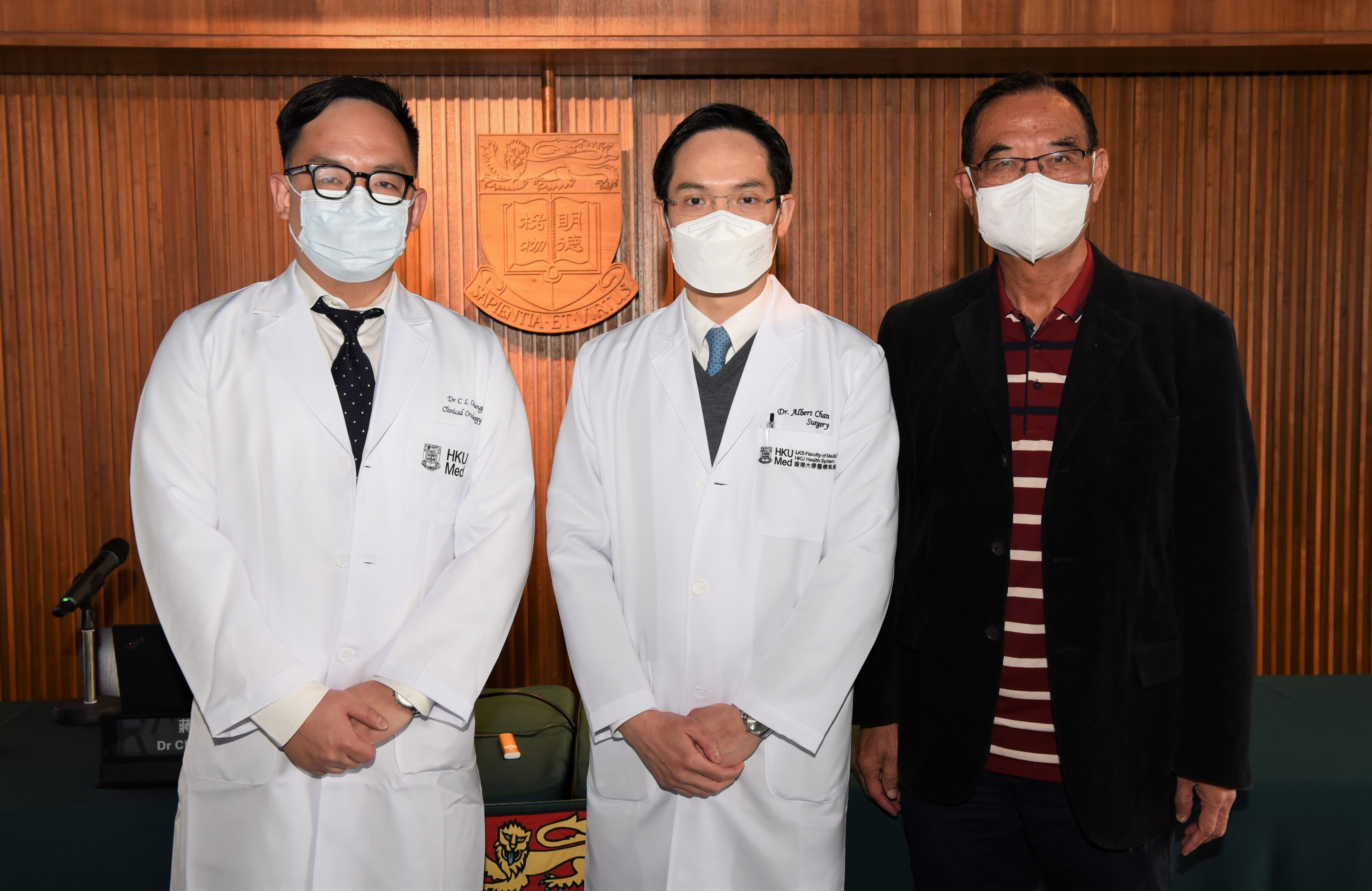11 January 2023
Download presentation diagrams
A pioneering phase II clinical study on tri-modality therapy (START-FIT), conducted by the Department of Surgery and Department of Clinical Oncology, School of Clinical Medicine, LKS Faculty of Medicine of the University of Hong Kong (HKUMed), has found that nearly 50% of patients with inoperable locally advanced liver cancer, can be cured through such an innovative approach. This revolutionary result has been published in The Lancet Gastroenterology and Hepatology [Link to the publication].
Background
Liver cancer is the sixth most common cancer globally with more than 900,000 new cases every year and is the third leading cause of cancer-related mortality.[1] According to Hong Kong Cancer Registry, there are about 1,800 new cases every year.[2] However, only 30% is eligible for curative treatment, while the rest could solely be managed with non-curative option due to large tumour size, or vascular invasion etc. The research team focused on these 70% inoperable cases and developed a new treatment modality to improve their chance of cure.
Research findings
A total of 33 patients were screened and enrolled in this treatment method from March 2019 to January 2021, for tumour diameter ranging from 5 to 17.5cm. 64% patients had tumours with major vascular invasion that precluded them from curative surgical procedure. The research team developed a new approach termed ‘Reduce and Remove’ – a tri-modality therapy (START-FIT) for these 33 patients. Patients would receive Transarterial Chemoembolisation (TACE) on day 1 for local tumour control, followed by Stereotactic Body Radiation Therapy (SBRT) on day 28, and then Immunotherapy administered 14 days following SBRT and every 2 weeks thereafter. In brief, this tri-modality approach is to downstage the tumour status amenable to surgical intervention in order to achieve cure for liver cancer.
After this novel tri-modality therapy, 55% (18 patients) became suitable to receive curative surgery, which 4 patients (12%) had undergone operation, and 14 patients (42%) had complete necrotic tumour who chose to keep close monitoring with regular scans. After up to two years and a half of follow-up, two-year survival among these patients exceeded 90%, with mild side-effect experienced throughout the whole treatment process. The advantages of this approach are minimally invasive with short hospital stay and a relatively high safety profile. The most common side effect includes temporary liver function derangement after TACE, and few patients may develop some mild immune related reaction.
Research significance
This innovative treatment strategy provides an opportunity for patients who were initially not suitable to receive curative surgical operation, to achieve cure with promising long-term outcome. ‘This treatment strategy provides a definite treatment schedule. Most patients could have an idea on the treatment effect within 6 months after the start of treatment and be able to have better planning for themselves and their family. Now the team is looking forward to expand the treatment coverage to more patients, especially those with poor liver function, to help downstaging the tumour status and hence, increase the chance of fitting into the criteria for liver transplantation in the future. We are also seeking ways to improve the efficacy of immunotherapy, from single agent to double agents, to deliver a more enhanced and solid treatment result,’ shared by Professor Albert Chan Chi-yan, Clinical Professor, Department of Surgery, School of Clinical Medicine, HKUMed, who initiated this global first novel tri-modality therapy.
About the research team
The study is led by Professor Albert Chan Chi-yan, Clinical Professor, Department of Surgery and Dr Chiang Chi-leung, Clinical Assistant Professor, Department of Clinical Oncology, School of Clinical Medicine, HKUMed. Other collaborators include Dr Keith Chiu Wan-hang, Dr Vince Lau Wing-hang, Dr Catherine Wan Wing-suet, Department of Diagnostic Radiology, School of Clinical Medicine, HKUMed; Dr Dai Wing-chiu, Professor Nancy Man Kwan, Professor Lo Chung-mau, Department of Surgery, School of Clinical Medicine, HKUMed; Dr Kenneth Chan Sik-kwan, Dr Lam Tai-chung, Dr Aya El Helali, Professor Spring Kong Feng-ming, Department of Clinical Oncology, School of Clinical Medicine, HKUMed; Dr James Li Chun-bong, former Assistant Professor, Department of Paediatrics and Adolescent Medicine, School of Clinical Medicine, HKUMed; Dr Francis Lee Ann-shing, Dr Natalie Wong Sean-man and Dr Venus Lee Wan-yan, Department of Clinical Oncology, Tuen Mun Hospital; Dr Chen Wenqi, Clinical Oncology Center, the University of Hong Kong – Shenzhen Hospital; Dr Andy Cheung Lai-yin, Department of Clinical Oncology, Queen Mary Hospital.
[1] World Health Organization 2022 <https://gco.iarc.fr/today/online-analysis-table>
[2] Hong Kong Cancer Registry 2020 <https://www3.ha.org.hk/cancereg/topten.html>
Media enquiries
Please contact LKS Faculty of Medicine of The University of Hong Kong by email (medmedia@hku.hk).


Follow HKUMed